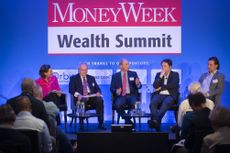Is Bayer a bargain stock despite the litigation surrounding Roundup?
The German chemicals group Bayer’s lawsuits over its Roundup weedkiller could throttle its profits. But is the gloom overdone? Matthew Partridge reports


“Only hours away” from another jury trial over its weedkiller Roundup, Germany’s Bayer has secured a postponement to allow room for “escalating settlement talks” to continue, reports Laura Kusisto and Ruth Bender in The Wall Street Journal.
This has raised hopes that Bayer may be close to settling claims related to allegations that Roundup causes cancer, which have already caused Bayer to lose three individual cases, leaving it liable for a total of $190.5m in compensation. A fourth adverse verdict could have handed the 42,000 plaintiffs involved so far “additional ammunition in settlement talks that have dragged on for months”.
A settlement won’t come cheap, says Fortune. Experts believe that settling the “tens of thousands” of claims, which could eventually rise to as much as 85,000, could cost around $10bn, with some even putting the costs at $13bn.
Subscribe to MoneyWeek
Subscribe to MoneyWeek today and get your first six magazine issues absolutely FREE

Sign up to Money Morning
Don't miss the latest investment and personal finances news, market analysis, plus money-saving tips with our free twice-daily newsletter
Don't miss the latest investment and personal finances news, market analysis, plus money-saving tips with our free twice-daily newsletter
The lower estimate would imply $8bn to resolve current cases and $2bn set aside for future claims, including those related to diseases such as non-Hodgkin’s lymphoma “which can take years to diagnose”. There’s also the problem of trying to simultaneously negotiate with the various groups of plantiffs’ attorneys, “each with a sizable inventory of cases”.
The fact that Bayer’s shares rose by 4% on the news of the postponement suggests there is a risk that shareholders’ expectations “are getting carried away”, says Chris Hughes on Bloomberg. There remains a “real possibility” that the “saga” endures for longer than investors have anticipated if talks between the two sides break down. Indeed, given that Bayer still believes that Roundup doesn’t cause cancer, it could simply decide that it would be better off taking a chance on a trial if an acceptable figure cannot be reached.
The positive scenario
However, if a deal does end up being signed then shareholders could stand to do very well, as the chemical giant currently still trades at a “substantial discount” to its peers. The gap is worth “much more” than the settlement costs being discussed.
Just getting to a valuation matching its cheapest counterparts “would add about €20bn of market value, after deducting the estimated cost of ending litigation”, while a move toward the average of its peer group would see the market value rise even higher.
Shareholders may be relieved at the “fairly modest” settlement, say Ed Cropley and Aimee Donnellan on Breakingviews. Still, they are still entitled to be “hopping mad” at the fact that Bayer got itself into the mess in the first place by buying Monsanto (which originally developed the drug) for $66bn in 2018. A Bayer investor who bought shares when the deal with Monsanto was completed would still have lost nearly 20% of their stake today, while those who invested in other drug companies would have made big profits. Bayer CEO Werner Baumann “has a lot of work to do” to ensure that Bayer’s shares close the gap.
Matthew graduated from the University of Durham in 2004; he then gained an MSc, followed by a PhD at the London School of Economics.
He has previously written for a wide range of publications, including the Guardian and the Economist, and also helped to run a newsletter on terrorism. He has spent time at Lehman Brothers, Citigroup and the consultancy Lombard Street Research.
Matthew is the author of Superinvestors: Lessons from the greatest investors in history, published by Harriman House, which has been translated into several languages. His second book, Investing Explained: The Accessible Guide to Building an Investment Portfolio, is published by Kogan Page.
As senior writer, he writes the shares and politics & economics pages, as well as weekly Blowing It and Great Frauds in History columns He also writes a fortnightly reviews page and trading tips, as well as regular cover stories and multi-page investment focus features.
Follow Matthew on Twitter: @DrMatthewPartri
-
 Adidas, Nike or Jordans - could collectable trainers make you rich?
Adidas, Nike or Jordans - could collectable trainers make you rich?The right pair of trainers can fetch six figures. Here's how you can start collecting vintage Adidas, Nike or Jordans now
By Chris Carter Published
-
 Early bird ISA investors flock to global funds, India and the US
Early bird ISA investors flock to global funds, India and the USThere’s been an increase in investors maxing out their ISA at the start of the new tax year. But where are they putting their cash and why does it make sense to be an early bird investor?
By Vaishali Varu Published
-
 Halifax: House price slump continues as prices slide for the sixth consecutive month
Halifax: House price slump continues as prices slide for the sixth consecutive monthUK house prices fell again in September as buyers returned, but the slowdown was not as fast as anticipated, latest Halifax data shows. Where are house prices falling the most?
By Kalpana Fitzpatrick Published
-
 Rents hit a record high - but is the opportunity for buy-to-let investors still strong?
Rents hit a record high - but is the opportunity for buy-to-let investors still strong?UK rent prices have hit a record high with the average hitting over £1,200 a month says Rightmove. Are there still opportunities in buy-to-let?
By Marc Shoffman Published
-
 Pension savers turn to gold investments
Pension savers turn to gold investmentsInvestors are racing to buy gold to protect their pensions from a stock market correction and high inflation, experts say
By Ruth Emery Published
-
 Where to find the best returns from student accommodation
Where to find the best returns from student accommodationStudent accommodation can be a lucrative investment if you know where to look.
By Marc Shoffman Published
-
 Best investing apps
Best investing appsWe round up the best investing apps. Looking for an easy-to-use app to help you start investing, keep track of your portfolio or make trades on the go?
By Ruth Emery Last updated
-
 The world’s best bargain stocks
The world’s best bargain stocksSearching for bargain stocks with Alec Cutler of the Orbis Global Balanced Fund, who tells Andrew Van Sickle which sectors are being overlooked.
By Andrew Van Sickle Published
-
 Revealed: the cheapest cities to own a home in Britain
Revealed: the cheapest cities to own a home in BritainNew research reveals the cheapest cities to own a home, taking account of mortgage payments, utility bills and council tax
By Ruth Emery Published
-
 UK recession: How to protect your portfolio
UK recession: How to protect your portfolioAs the UK recession is confirmed, we look at ways to protect your wealth.
By Henry Sandercock Last updated